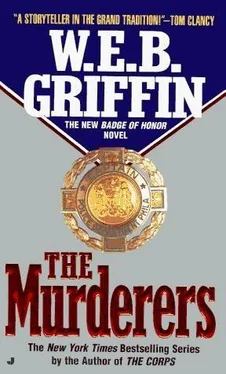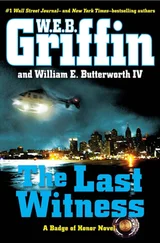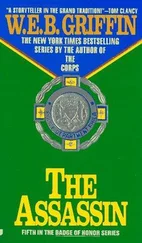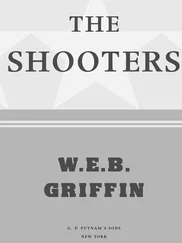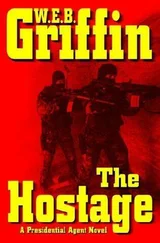W.E.B Griffin - The Murderers
Здесь есть возможность читать онлайн «W.E.B Griffin - The Murderers» весь текст электронной книги совершенно бесплатно (целиком полную версию без сокращений). В некоторых случаях можно слушать аудио, скачать через торрент в формате fb2 и присутствует краткое содержание. Жанр: Криминальный детектив, на английском языке. Описание произведения, (предисловие) а так же отзывы посетителей доступны на портале библиотеки ЛибКат.
- Название:The Murderers
- Автор:
- Жанр:
- Год:неизвестен
- ISBN:нет данных
- Рейтинг книги:3 / 5. Голосов: 1
-
Избранное:Добавить в избранное
- Отзывы:
-
Ваша оценка:
- 60
- 1
- 2
- 3
- 4
- 5
The Murderers: краткое содержание, описание и аннотация
Предлагаем к чтению аннотацию, описание, краткое содержание или предисловие (зависит от того, что написал сам автор книги «The Murderers»). Если вы не нашли необходимую информацию о книге — напишите в комментариях, мы постараемся отыскать её.
The Murderers — читать онлайн бесплатно полную книгу (весь текст) целиком
Ниже представлен текст книги, разбитый по страницам. Система сохранения места последней прочитанной страницы, позволяет с удобством читать онлайн бесплатно книгу «The Murderers», без необходимости каждый раз заново искать на чём Вы остановились. Поставьте закладку, и сможете в любой момент перейти на страницу, на которой закончили чтение.
Интервал:
Закладка:
“This is Police Officer Thomas Coogan, badge number 3621. I have been trying to reach 555-2330. This is an emergency. Will you break in, please?”
“There’s no one on the line, sir,” the operator reported thirty seconds later. “The phone is probably off the hook.”
“Thank you,” Coogan said.
The fact that the phone is off the hook doesn’t mean he’s not there. He could have come home shitfaced, knocked it off falling into bed, or on purpose so that he wouldn’t be disturbed. He’s probably lying there in bed, sleeping it off.
That posed the problem of what to do next. He realized he didn’t want to drive all the way over to Kellog’s house to wake him up, for a number of reasons, including the big one, that Sergeant Dolan was liable to ask him where the fuck he was going.
He thought a moment, then reached for his telephone.
“Twenty-fifth District, Officer Greene.”
“Tom Coogan, Narcotics. Who’s the supervisor?”
“Corporal Young.”
“Let me talk to him, will you?”
He knew Corporal Eddie Young.
“Tom Coogan, Eddie. How are you?”
“Can’t complain, Tom. What’s up?”
“Need a favor.”
“Try me. All I can say is ‘no.’”
“One of our guys, Jerry Kellog, you know him?”
“No, I don’t think so.”
“He lives at 300 West Luray Street. He’s supposed to be here. Our Sergeant is shitting a brick. Could you send somebody over to his house and see if he’s there and wake him up and tell him to get his ass over here? I’ve been trying to call him. His phone is off the hook. I think he’s probably sleeping one off.”
“Give me the address again and it’s done, and you owe me one.”
A nearly new Buick turned off Seventh Street and into the parking lot at the rear of the Police Administration Building of the City of Philadelphia. The driver, Mr. Michael J. O’Hara, a wiry, curly-haired man in his late thirties, made a quick sweep through the parking lot, found no parking spot he considered convenient enough, pulled to the curb directly in front of the rear entrance to the building, and got out.
A young police officer who had been on the job just over a year, and assigned to duty at the PAB three days before, intercepted Mr. O’Hara as he headed toward the door.
“Excuse me, sir,” he said. “You can’t leave your car there.”
Mr. O’Hara smiled at what he considered the young officer’s rather charming naivete.
“It’s OK, son,” he said. “I’m Commissioner Czernich’s bookie.”
“Excuse me?” the young officer said, not quite believing what he heard.
“The Commissioner,” Mr. O’Hara went on, now enjoying himself, “put two bucks on a long shot. It paid a hundred ninety-eight eighty. When I come here to pay him off, he says I can park anywhere I want.”
The young officer’s uneasiness was made worse by the appearance of Chief Inspector Heinrich “Heine” Matdorf, Chief of Training for the Philadelphia Police Department, whom the young officer remembered very clearly from his days at the Police Academy. It was the first time the young officer had ever seen him smile.
“What did you tell him?” Chief Matdorf asked.
“I told him I was Czernich’s bookie.”
“Jesus Christ, Mickey!” Matdorf laughed, patting him on the back as he did so.
As the young police officer had begun to suspect, the driver of the Buick was not a bookmaker. Mr. Michael J. “Mickey” O’Hara was in fact a Pulitzer Prize-winning reporter employed by the Philadelphia Bulletin. There was little question in the minds of his peers-and absolutely none in his own mind-that he was the best police reporter between Boston and Washington, and possibly in an even larger geographical area.
Mickey O’Hara extended his hand to Matdorf’s driver, a sergeant.
“How are you, Mr. O’Hara?” the Sergeant asked, a respectful tone in his voice.
“Heine,” O’Hara asked, “have you got enough pull around here to tell this fine young officer I can park here?”
“The minute he goes inside,” Chief Matdorf instructed the young officer, “let the air out of his tires.”
“Thanks a lot, Heine.”
“What’s going on, Mickey?”
“I hoped maybe you could tell me,” O’Hara said.
“So far as I know, not much. There was nothing on the radio.”
“I know,” O’Hara said.
“Going in, Mickey?” Matdorf asked.
“I got to pay off the Commissioner,” O’Hara said. “And I thought I might take a look at the Overnights.”
The Overnights were reports from the various districts and other bureaucratic divisions of the Philadelphia Police Department of out-of-the-ordinary police activity overnight furnished to senior police officials for their general information.
They were internal Police Department correspondence not made available to the public or the press. Mr. Michael J. O’Hara, as a civilian, and especially as a journalist, was not entitled to be privy to them.
But Mickey O’Hara enjoyed a special relationship with the Police Department. He was not in their pocket, devoting his journalistic skills to puff pieces, but on the other hand, neither did he spend all of his time looking for stories that made the Department or its officers look bad. Most important, he could be trusted. If he was told something off the record, it stayed off the record.
“Come on in, then,” Chief Matdorf said. “I’ll even buy you a cup of coffee.”
He touched O’Hara’s arm and they started toward the rear door of the building. There is a front entrance, overlooking Metropolitan Hospital, but it is normally locked. The rear door opens onto a small foyer. Just inside is a uniformed police officer sitting behind a heavy plate-glass window controlling access to the building’s lobby with a solenoid switch.
To the right is a corridor leading past the Bail Clerk’s Office and the Arraignment Room to the Holding Room. The Municipal Judge’s Court is a small, somewhat narrow room separated from the corridor by heavy glass. There are seats for spectators in the corridor. Farther to the right is the entrance to the Holding Room, in effect a holding prison, to which prisoners brought from the various police districts and initially locked up in cells in the basement are brought to be booked and to face a Municipal Court Judge, who sets bail. Those prisoners for whom bail is denied, or who can’t make it, are moved, males to the Detention Center, females to the House of Correction.
When the corporal on duty behind the plate-glass window saw Chief Matdorf, he activated the solenoid, the lock buzzed, and Matdorf pushed the door open and waved O’Hara through it ahead of him into the lobby of the PAB, where the general civilian populace is not allowed.
They walked toward the elevators, past the wall display of photographs of police officers who have been killed in the line of duty. As they approached the elevator, the door opened and discharged a half-dozen people, among them Chief Inspector Dennis V. Coughlin and Inspector Peter Wohl.
“Hey, whaddaya say, Mickey?” Chief Coughlin greeted him with a smile, and offered his hand.
“Hello, Mick,” Wohl said, as he offered his hand first to O’Hara and then to Chief Matdorf.
Mickey O’Hara had not earned the admiration of his peers, or the Pulitzer Prize, by being wholly immune to the significance of body language.
Despite that warm greeting, neither of these two is at all happy to see me. That means that something is going on that they would rather not tell me about just now. And what are the two of them doing together this early in the morning?
“What’s up, Mickey?” Chief Coughlin asked.
“I hoped maybe you would tell me.”
Chief Coughlin shrugged, indicating nothing.
Читать дальшеИнтервал:
Закладка:
Похожие книги на «The Murderers»
Представляем Вашему вниманию похожие книги на «The Murderers» списком для выбора. Мы отобрали схожую по названию и смыслу литературу в надежде предоставить читателям больше вариантов отыскать новые, интересные, ещё непрочитанные произведения.
Обсуждение, отзывы о книге «The Murderers» и просто собственные мнения читателей. Оставьте ваши комментарии, напишите, что Вы думаете о произведении, его смысле или главных героях. Укажите что конкретно понравилось, а что нет, и почему Вы так считаете.
